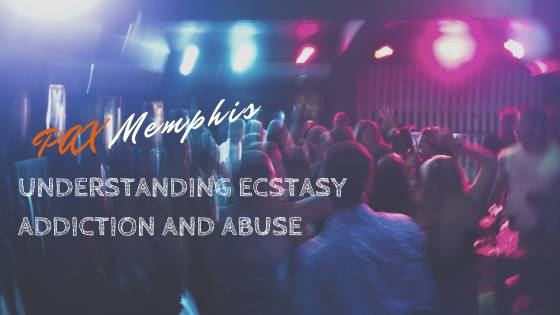Ecstasy is a “party drug” or “club drug” that is popular among teens and young adults. The drug is commonly referred to as MDMA or molly, and many young people see no harm in taking it at parties, concerts, or raves. However, ecstasy abuse leads to severe and long-term consequences. In some cases, long-term abuse leads to ecstasy addiction.
MDMA is the key chemical component in ecstasy. Sometimes, ecstasy contains MDMA and other drugs, like amphetamines, opiates, hallucinogens, or benzodiazepines. MDMA is an illicit synthetic stimulant that is known to have hallucinogenic effects. Ecstasy usually comes in pill form, while molly describes white powdered MDMA. Although it is a popular drug of abuse, MDMA and ecstasy are Schedules I controlled substances, indicating a high potential for abuse with no proven medicinal benefits. If you or a loved one is suffering from ecstasy addiction, the best solution is to find a drug rehab near you today.
What You Need to Know About Ecstasy Abuse
Ecstasy produces feelings of happiness, friendliness, joy, and overall well being. In addition, they are known to heighten a person’s sense of smell, touch, sound, and sight – which is why the drug is so popular at music events, shows, and parties. As an illegal drug, any use of it whatsoever is considered abuse. When ecstasy is taken, users experience the following effects:
- Energy that may last for several hours
- Lowered inhibitions
- Feelings of empathy, affection, and connection towards others
- Enhanced senses
- Euphoria and relaxation
- Distorted perception of time
- Emotional warmth
The effects of ecstasy impact the pleasure center of the brain and increase dopamine production. The high is long-lasting, and the effects sometimes last up to 8 hours. Unfortunately, the high is often followed by a crash – which can last for several days. Although the high may seem pleasurable and rewarding, the crash is usually characterized by irritability, depression, loss of appetite, sleep problems, and fatigue.[1]
As a “party drug,” ecstasy is often abused with other drugs, like marijuana, hallucinogens, alcohol, opiates, and more. Rates of polydrug use are higher among people who abuse ecstasy than many other types of drug users. Studies show that approximately 10% of college students have taken the drug. Overall, more than 18 million people nationwide have tried MDMA at least once.[2]
The Dangers of Ecstasy Abuse
Ecstasy is manufactured in clandestine laboratories, so people never really know what they are getting. The pills and powder could be cut with or contain a variety of different substances, some more dangerous than others. As a result, overdose becomes a possibility. High doses of ecstasy reduce the body’s ability to regulate its temperature, leading to dangerous spikes in body temperature. Consequently, ecstasy abuse may result in damage to the liver, kidney, or heart. In extremely high doses, ecstasy can be lethal.
Since ecstasy promotes closeness and trust between people, it may encourage unprotected sex and risky behaviors. This increases a person’s chance of contracting a sexually transmitted disease or making poor decisions. [1]
Chronic ecstasy abuse puts excess stress on the heart. Over time, this may increase blood pressure, damage the kidneys, ad affect specific neurons in the brain. Studies show that long term ecstasy abuse leads to cognitive deficits, learning problems, and memory issues.[2]
Is Ecstasy Addiction Real?
Ecstasy addiction is thought to be less addictive than many other drugs. However, this doesn’t mean that ecstasy addiction isn’t dangerous or real. In fact, it is a serious problem for people who suffer from it, and it often leads to devastating consequences and effects.
Spotting ecstasy addiction isn’t always easy. After all, ecstasy abuse usually doesn’t result in severe withdrawal symptoms or physical dependence. Many people think of ecstasy as a social drug, so they don’t realize that it is addictive. Continued ecstasy abuse often leads to psychological dependence, causing individuals who are addicted to ecstasy to continue using the drug despite any negative consequences.
A tell-tale sign of ecstasy addiction is desperately wanting to stop or moderate drug use, but being unable to do so. Individuals usually develop a tolerance, as well, meaning they need more and more of the drug to produce the euphoria they are chasing. People suffering from ecstasy addiction typically experience the following symptoms when they try to stop using:
- Depression
- Cravings
- Loss of appetite
- Fatigue
- Trouble concentrating
Even though the severity of ecstasy addiction may be lesser than some other addictions, it still warrants help from professional drug rehab.
Getting Treatment for Ecstasy Addiction
Ecstasy abuse and addiction wreak havoc on the lives of individuals who cannot control their use. Fortunately, behavioral therapy and a comprehensive drug rehab program show promise in treating ecstasy addiction. If you or a loved one is suffering from ecstasy addiction or can’t stop using the drug, know that help is available. The sooner you find help for addiction, the better. Reach out today to speak with an addiction treatment specialist to learn about your drug rehab options.
References:
Medically Reviewed: September 25, 2019

All of the information on this page has been reviewed and verified by a certified addiction professional.










